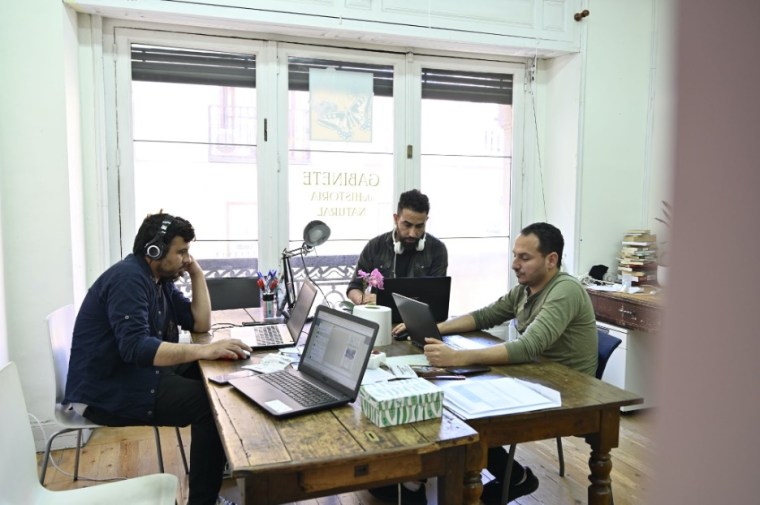The Torch is a weekly newsletter from the Committee to Protect Journalists that brings you the latest press freedom and journalist safety news from around the world. Subscribe here.
Today marks the 30th anniversary of the Windhoek Declaration, which came out of a conference attended by independent journalists and was supported by a dozen international organizations. Two years after that gathering in Namibia, the United Nations declared May 3 World Press Freedom Day. As UNESCO notes, “The ideas exchanged by African journalists and media professionals [during the conference] acted as a catalyst to encourage press freedom, independence and pluralism in Africa and in other parts of the world.”
From Syria to Spain: The story of Madrid’s first refugee-led news site
In May 2019, Syrian journalists Ayham al-Gareeb, Mohammad Shubat, Mousa al-Jamaat, and Okba Mohammad landed in Madrid-Barajas Airport with the help of CPJ. They left behind war, but also their homes and careers as journalists. A new life in a new country awaited them.
Just one year earlier, CPJ learned that several local journalists were trapped in and around the southern Syrian city of Daraa as forces loyal to President Bashar al-Assad moved to regain control of the province. We worked tirelessly alongside other organizations to transport the journalists to safety. The four reporters arriving that day in Spain were among the 11 journalists CPJ’s Middle East and North Africa representative, Ignacio Miguel Delgado, put on a flight to Spain from Turkey.
Fast forward two years later, the four journalists launched the news website Baynana (“Between us” in Arabic), Spain’s first refugee-led news site, in April 2021, with the support of CPJ and Spain’s por Causa, a foundation that promotes investigative journalism about migration.
The Arabic and Spanish language website seeks to provide useful information for the growing Arabic-speaking community in Spain and counter negative stereotypes surrounding migrants and refugees. “The launching of Baynana is one of the most exciting developments in the Spanish media landscape in recent years,” Carlos Martinez de la Serna, CPJ program director and a Madrid-native, told The Torch newsletter. “It will consistently bring other voices and perspectives to the conversation on key topics and issues, and will enrich the overall journalism community.”
“I am happy that I was able to design Baynana’s website. I am grateful for the opportunity of doing something I love,” al-Jamaat, 29, who is also a reporter and a photographer for the outlet, told CPJ.
“CPJ has helped us in so many ways. Firstly, they helped us to get out of war and relocate to a safe country like Spain. In my case, they also helped my wife and daughters to get here. CPJ also helped us to start Baynana and that will help us to continue to work in journalism, something we love,” al-Gareeb, 32, the website’s editor, told us.
This World Press Freedom Day, CPJ remains grateful and in awe of the work of these brave journalists and so many others around the globe who fight to tell important stories. Their voices are critically important in supporting free expression.
Check out Baynana’s website here (in Spanish and Arabic), and follow the outlet on Twitter.
Do you have an Amazon Alexa-enabled device? Enable CPJ's flash briefing skill to stay up to date with the latest press freedom news from around the world.
